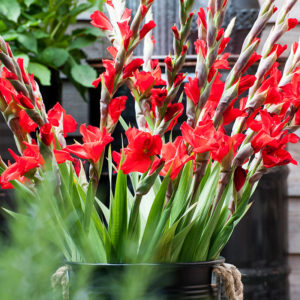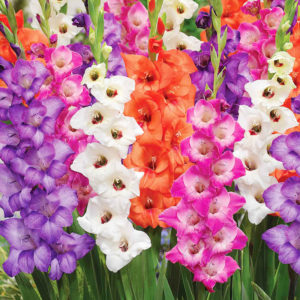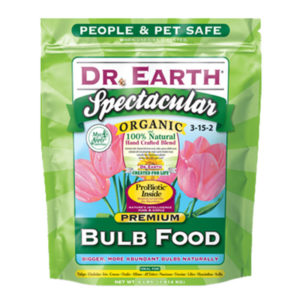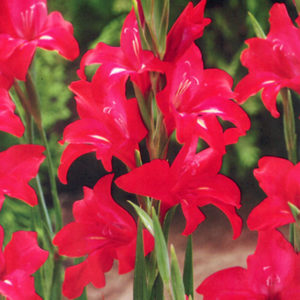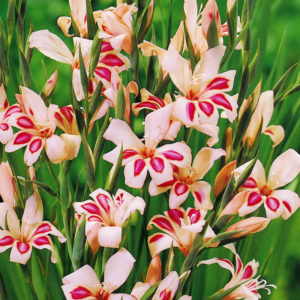Imagine you are walking through your favorite local farmer’s market in August. You see delicious tomatoes, cucumbers, and other summer vegetables. You will also most likely see a wide selection of cut flowers for bouquets at the farmers market. One of the cut flowers you will probably see are colorful gladiolus flowers. These mid to late summer blooming flowers are not only for farmer’s markets but are popular in conventional flower arrangements as well. For gardeners that want colorful blooms in their home and garden, growing gladiolus is a great way to do that.
Traditional gladiolus will grow 4-5′ tall and bloom mid to late summer. They are winter hardy in zones 8 and above and come in an assortment of colors including two-tone blooms. Our complete guide to growing gladiolus has all the information you need to know about growing gladiolus in your garden this summer.
How to Plant Gladiolus?
Gladiolus corms are a type of bulb. The gladiolus corms have a somewhat pointed end. It is usually very easy to spot the pointed end on your gladiolus corms. The pointed end of the bulb should face the sky. Plant your gladiolus corms 3-4″ deep.
Gladiolus can be planted in rows. Planting in rows is most common when growing gladiolus for cut flower use. They can also be used in a mixed garden border or planted in clumps among perennials and annuals.
Where to Plant Gladiolus?
Plant your gladiolus corms in a sunny location. Gladiolus bulbs require 6-8 hours of full sun per day in order to produce large flowers. Like most flower bulbs gladiolus prefer soil that is moist but drains well. Amending your soil with a plant starter mix or compost will help improve the drainage.
Traditional gladiolus varieties will grow 4-5′ tall and therefore require a place where they can be seen when mature. Miniature Gladiolus such as the Bambino Gladiolus Mix grows 2-2.5′ tall and does not require staking; these can be grown in containers as well as the middle of a garden bed. Hardy Miniature Gladiolus are some of the shortest gladiolus available and reach a maximum height of 2′. Hardy Miniature Gladiolus can be grown in containers as well as the front of your garden beds and borders.
When to Plant Gladiolus?
Gladiolus are native to Africa, therefore these summer-blooming flowers prefer warm soil and warm climates to grow their best. They can be grown on all US hardiness zones when treated as an annual in zones 1-7. When planting your gladiolus the soil should be warm, at least 55 degrees. If you are not sure about the soil temperature, a good rule of thumb is to plant once the danger of frost has passed.
How Long Does it Take for Gladiolus to Bloom?
Gladiolus will bloom in 60-90 days after planting depending on the variety and weather conditions. A common practice when planting gladiolus is to stagger your plantings every 1-2 weeks. Since they bloom in 60-90 days if you stagger your plantings you will lengthen the bloom time, and have fresh cut flowers for multiple weeks in summer.
Do Gladiolus bulbs need to be Fertilized?
Gladiolus benefit from being fertilized when the buds are first starting to form. You can feel for buds developing by gently pinching towards the base of the leaf. If the leaves on the gladiolus feel flat the bud has not formed above ground yet. If you notice a bulge near the base of the leaves, that means the buds are developing. At this time you can add a fertilizer high in phosphorus which helps buds develop. Dr. Earth Spectacular Bulb Food is a good choice of fertilizer for your gladiolus corms.
How Do You Stake Gladiolus?
Tall varieties of gladiolus require staking, as the flower buds and flowers can be top-heavy and cause the plants to fall over. When growing gladiolus in rows set up stakes at the end of each row with a string line connecting each stake. Setting up the stakes and string lines should be done at the time of planting. You will need to monitor the stakes and string lines as the gladiolus begins to grow.
When growing gladiolus in a clump in the garden you can use a support such as a peony or a tomato cage to support the leaves and flowers. Support structures around the gladiolus should be placed in the garden when the leaves begin to emerge from the ground.
Do Gladiolus Spread?
Gladiolus bulbs do not naturally spread in the garden. However, the bulbs do multiply and create baby bulbs. Gladiolus bulbs can be propagated by digging up and dividing the young, new bulbs at the end of the growing season.
What are Hardy Miniature Gladiolus?
Traditional gladiolus varieties can grow as tall as 4-5′. Miniature gladiolus like Impressive Miniature Gladiolus and Robinetta Miniature Gladiolus have showy blooms that are slightly smaller than traditional gladiolus. Miniature gladiolus varieties also retain a shorter stature, only growing 18-24″ tall. Because of their short stature miniature gladiolus do not require staking. Another bonus of miniature gladiolus (Gladiolus nanus) is that they are winter hardy in colder hardiness zones such as zones 5 and 6
How do I store Gladiolus for Winter?
Gladiolus are winter hardy in zones 8 and above. Gladiolus will overwinter in zones 6 and 7 if certain conditions are met. A mild winter, mulch added to the planting area, and being planted near your home can all increase winter survival. Gardeners in cold climates will either treat the gladiolus as annual and re-plant every season or store the bulbs for winter. To store your gladiolus for winter you will need to remove the bulbs from the ground before the first hard frost of the fall season.
When you are ready to store the corms, carefully remove the gladiolus plants including the corms underground by digging up the clumps or individual gladiolus plants. Remove as much soil from the corms as possible. Remove the leaves from the gladiolus corms, so that only a 1-2″ of the leaf remains above the corm. Allow the gladiolus corms to dry in a warm location prior to storing. When the bulbs appear dry and you are ready to store in a location that is cool, above freezing, and not too dry or damp. A paper bag will work to store the gladiolus bulbs over winter. Dust the bulbs with an insecticide as well as anti-fungal powder prior to storing.
Growing Gladiolus in Your Garden this Summer
Gladiolus are often referred to as Sword Lilies because of their sword-like foliage. They require a little bit of maintenance when it comes to staking the plants; however, they are relatively easy to grow and care for. If you follow the recommendation to stagger the planting of your gladiolus corms over the period of several weeks you will have several weeks of blooms at the end of summer. Plant your gladiolus with colorful dahlias for a big burst of color mid-to-late summer. If you want to grow large dahlia blooms to put in vases with your gladiolus our guide to growing the Big Bold Dahlia blooms has useful information to help you.


